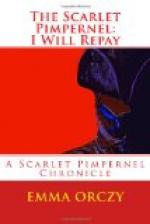He paused, exhausted at last, mopping his forehead, then drinking large gulps of brandy to ease his parched throat.
A veritable chorus of enthusiasm greeted the end of his long peroration. The Machiavelian scheme, almost devilish in its cunning, in its subtle knowledge of human nature and of the heart-strings of a noble organisation like Deroulede’s, commended itself to these patriots, who were thirsting for the downfall of a superior enemy.
Even Tinville lost his attitude of dry sarcasm; his thin cheeks were glowing with the lust of the fight.
Already for the past few months, the trials before the Committee of Public Safety had been dull, monotonous, uninteresting. Charlotte Corday had been a happy diversion, but otherwise it had been the case of various deputies, who had held views that had become too moderate, or of the generals who had failed to subdue the towns or provinces of the south.
But now this trial on the morrow—the excitement of it all, the trap laid for Deroulede, the pleasure of seeing him take the first step towards his own downfall. Everyone there was eager and enthusiastic for the fray. Lenoir, having spoken at such length, had now become silent, but everyone else talked, and drank brandy, and hugged his own hate and likely triumph.
For several hours, far into the night, the sitting was continued. Each one of the score of members had some comment to make on Lenoir’s speech, some suggestion to offer.
Lenoir himself was the first to break up this weird gathering of human jackals, already exulting over their prey. He bad his companions a quiet good-night, then passed out into the dark street.
After he had gone there were a few seconds of complete silence in the dark and sordid room, where men’s ugliest passions were holding absolute sway. The giant’s heavy footsteps echoed along the ill-paved street, and gradually died away in the distance.
Then at last Foucquier-Tinville, the Public Prosecutor, spoke:
“And who is that man?” he asked, addressing the assembly of patriots.




